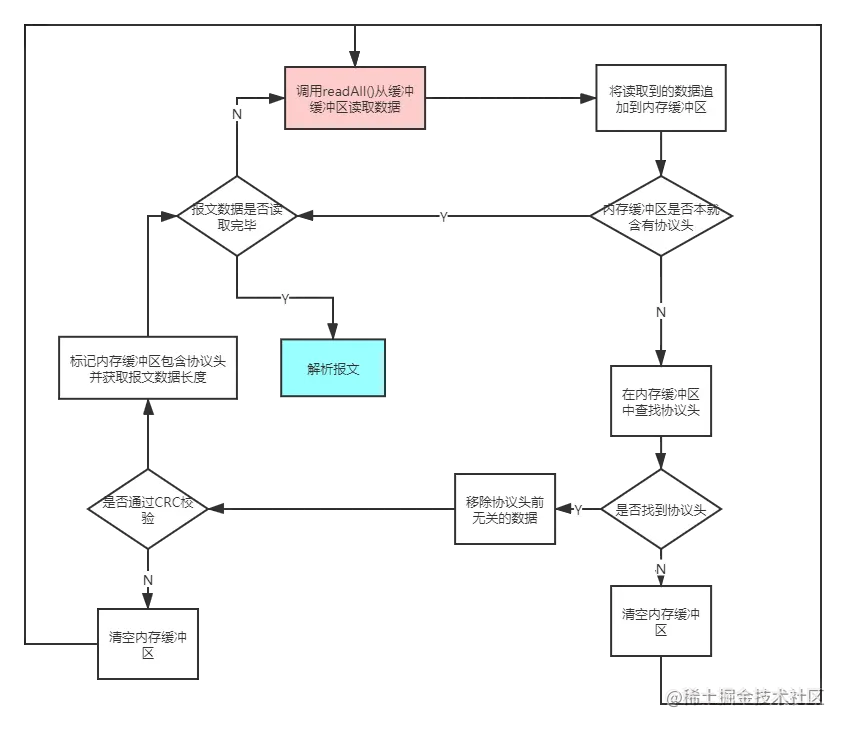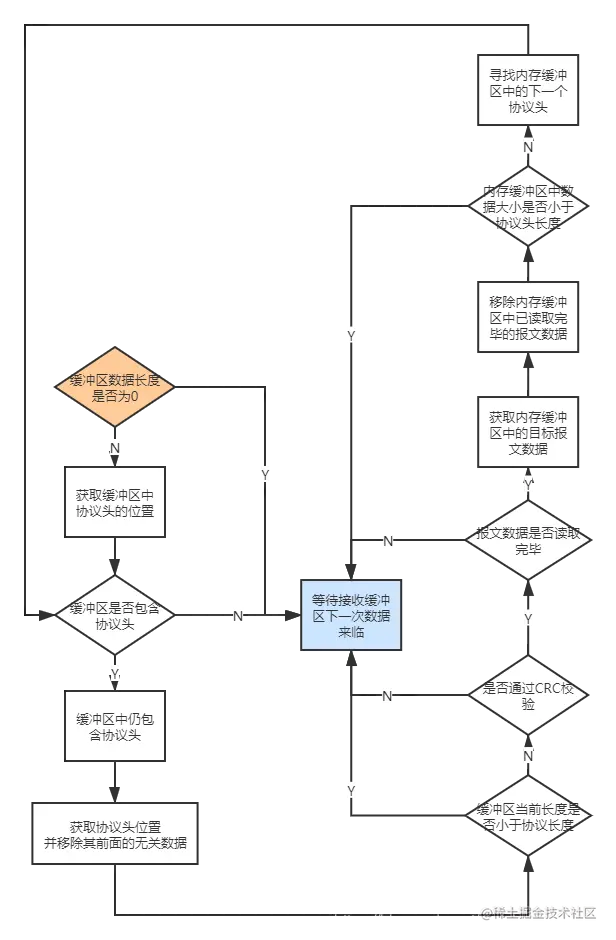1
2
3
4
5
6
7
8
9
10
11
12
13
14
15
16
17
18
19
20
21
22
23
24
25
26
27
28
29
30
31
32
33
34
35
36
37
38
39
40
41
42
43
44
45
46
47
48
49
50
51
52
53
54
55
56
57
58
59
60
61
62
63
64
65
66
67
68
69
70
71
72
73
74
75
76
77
78
79
80
81
82
83
84
85
86
87
88
89
90
91
92
93
94
95
96
97
98
99
100
101
102
103
104
105
106
107
108
109
110
111
112
113
114
115
116
117
118
119
120
121
122
123
124
125
126
127
128
129
130
131
132
133
134
135
136
137
138
139
140
141
142
143
144
145
146
147
148
149
150
151
152
153
154
155
156
157
158
159
160
161
162
163
164
165
166
167
168
169
170
171
172
173
174
175
176
177
178
179
180
181
182
| package main
import (
"bytes"
"encoding/binary"
"fmt"
"io"
"log"
)
const (
PRIVATE_HEAD uint32 = 0x55AA55AA
PROTOCOL_LENGTH uint32 = 16
)
type BufferData struct {
recevData []byte
hasHead bool
totalLen uint32
}
type CProtocalData struct {
Header uint32
Cmd uint32
Len uint32
Crc uint32
Data []byte
}
type CDataRecver struct {
buff BufferData
recvDataVector []CProtocalData
dataArrivedChan chan []byte
}
func NewCDataRecver() *CDataRecver {
return &CDataRecver{
dataArrivedChan: make(chan []byte, 100),
}
}
func (c *CDataRecver) SlotDataArrived(array []byte) {
c.buff.recevData = append(c.buff.recevData, array...)
c.checkBufferHasHead(&c.buff)
size := uint32(len(c.buff.recevData))
if size >= c.buff.totalLen {
c.parseBufferData(&c.buff, &c.recvDataVector)
}
log.Printf("current recv: %d, total size: %d", len(array), len(c.buff.recevData))
}
func (c *CDataRecver) checkBufferHasHead(bufferData *BufferData) {
if bufferData.hasHead {
return
}
index := bytes.Index(bufferData.recevData, uint32ToBytes(PRIVATE_HEAD))
if index == -1 {
bufferData.recevData = bufferData.recevData[:0]
return
}
if index > 0 {
bufferData.recevData = bufferData.recevData[index:]
}
if len(bufferData.recevData) < int(PROTOCOL_LENGTH) {
return
}
header, cmd, length, crc, _ := parseProtocolData(bufferData.recevData)
if !checkCRC(header, cmd, length, crc) {
log.Println("wrong crc")
bufferData.recevData = bufferData.recevData[:0]
bufferData.totalLen = 0
bufferData.hasHead = false
return
}
bufferData.hasHead = true
bufferData.totalLen = length
}
func checkCRC(header, cmd, length, crc uint32) bool {
rightCRC := header + cmd + length - PROTOCOL_LENGTH
return rightCRC == crc
}
func (c *CDataRecver) parseBufferData(bufferData *BufferData, vector *[]CProtocalData) {
for {
index := bytes.Index(bufferData.recevData, uint32ToBytes(PRIVATE_HEAD))
if index == -1 || len(bufferData.recevData) == 0 {
return
}
if index > 0 {
bufferData.recevData = bufferData.recevData[index:]
}
if len(bufferData.recevData) < int(PROTOCOL_LENGTH) {
break
}
header, cmd, length, crc, data := parseProtocolData(bufferData.recevData)
if !checkCRC(header, cmd, length, crc) {
log.Println("wrong crc")
bufferData.recevData = bufferData.recevData[:0]
bufferData.hasHead = false
bufferData.totalLen = 0
break
}
dataSize := uint32(len(data)) + PROTOCOL_LENGTH
if length > dataSize {
break
}
*vector = append(*vector, CProtocalData{
Header: header,
Cmd: cmd,
Len: length,
Crc: crc,
Data: data,
})
bufferData.recevData = bufferData.recevData[dataSize:]
bufferData.hasHead = false
if len(bufferData.recevData) < 4 {
break
}
}
}
func parseProtocolData(data []byte) (header, cmd, length, crc uint32, protocolData []byte) {
reader := bytes.NewReader(data)
binary.Read(reader, binary.BigEndian, &header)
binary.Read(reader, binary.BigEndian, &cmd)
binary.Read(reader, binary.BigEndian, &length)
binary.Read(reader, binary.BigEndian, &crc)
protocolData = make([]byte, length-PROTOCOL_LENGTH)
io.ReadFull(reader, protocolData)
return
}
func uint32ToBytes(n uint32) []byte {
b := make([]byte, 4)
binary.BigEndian.PutUint32(b, n)
return b
}
func main() {
receiver := NewCDataRecver()
go func() {
testData := []byte{0x55, 0xAA, 0x55, 0xAA, 0, 0, 0, 1, 0, 0, 0, 20, 0, 0, 0, 60, 1, 2, 3, 4}
receiver.dataArrivedChan <- testData
}()
for data := range receiver.dataArrivedChan {
receiver.SlotDataArrived(data)
}
fmt.Println("Received data:", receiver.recvDataVector)
}
|

